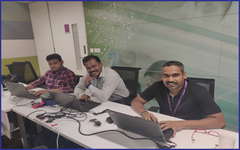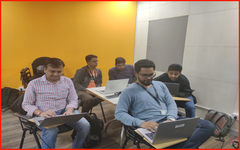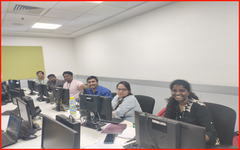Splunk Training Course & Certification by Expert Trainer
Description
Our DevOpsSchool Training institute will help you to learn this Splunk training course and to get certification from our best and expert trainers. We have both online as well as Offline classes for Splunk training.
The Splunk is a tool used for app management, security, and compliance, as well as business & web analytics. It uses machine data for identifying data patterns, offering metrics, examining problems, and providing intelligence for business operations.
This training course will make you an expert and capable Architect in Splunk Developers and Splunk Administration concepts.
This course covers all the functions of software development, software engineering, security & SIEM, configuration management, continuous inspection, cloud AWS/Azure, operations, continuous integration, etc.
Key Highlights
It includes Live & Interactive Sessions, 250 Hrs. Self-paced Videos, 60 Hrs. Project and Exercises which is certified by DevOpsSchool. Also, we will provide Life lifetime access to Videos Library, Interview & Assessment Support, and Designed for Working Professionals & Fresher, hands-on, Lifetime Free Upgrade using Videos Library. In our Institute, about 900+ Clients and 8000+ students enrolled for the 12 weeks program for weekends. In the 1st week of every month, batches start with 50+ hiring partners. For enrollment, the EMI options are also available for you. The DevOpsSchool is one of the top institutes for training and certification programs with a rating of 4.6 out of 5.
SUB Menu
Upcoming Batches | Eligibility | Skills Covered | Curriculum & Course Details | Certification | Reviews | Projects | FAQs | Video | Our Gallery
Upcoming Batches
1st week of every month
Eligibility
- Network Administrators
- System Administrators
- Application developers
- Software engineers
- Data engineers
- Solution architects
- IT professionals
- Security engineers
- IT Managers
- DevOps Practitioners
- Operations professionals
- Integration specialists
Who is this program for?
This program is for Security engineers, DevOps practitioners, Software engineers, IT professionals, System administrators, Operations professionals, and other related professionals.
Eligibility for this program:-
There are no such prerequisites for Splunk Program. That’s why we are will start all the concepts from scratch. Even, if any aspirant is planning to enter the IT world or Splunk this course will help them to get all the job-ready skills.
Skills Covered
- Introduction to Splunk
- Setting up the Splunk Environment Concept
- Basic Searching Techniques
- Enterprise Splunk Architecture
- Spelunking for DevOps and Security
- Application Development in Splunkbase
- Spelunking on Hadoop with Hunk
- Composing Advanced Searches
- Generating Visualizations Using Commands
- Creating Search Macros
- Course Summary
- Introduction
- Optimizing Splunk Knowledge
- Managing Splunk Fields
- Using Tags and Event Types
- Course Summary
- Getting Familiar with Data Models and the Pivot Tool in Splunk
- Diving Deeper into Data Models
- Identifying Data Model Attributes
- Building Dashboards, Reports, and Alerts Using the Data Model
Curriculum & Course Details
What Is Splunk? Concept
- What Is Splunk?
- Overview
- Machine Data
- Splunk Architecture
- Careers in Splunk
- Summary
Setting up the Splunk Environment Concept
- Overview
- Splunk Licensing
- Getting Splunk
- Installing Splunk
Adding Data to Splunk
- Summary
- Basic Searching Techniques –
- Overview
- Demo: Adding More Data
- Search in Splunk
- Demo: Splunk Search
- Splunk Search Commands
- Demo: Splunk Processing Language
- Splunk Reports
- Demo: Reporting in Splunk
- Splunk Alerts
- Demo: Alerts in Splunk
- Summary
Enterprise Splunk Architecture
- Overview
- Forwarders
- Enterprise Splunk Architecture
- Installing Forwarders
- Demo: Installing Forwarders
- Demo: Troubleshooting Forwarder Installation
- Summary
- Spelunking for DevOps and Security
- Cloud Computing Terminology and Concepts
- Overview
- Splunk in DevOps
- DevOps Demo
- Splunk in Security
- Enterprise Use Cases
- Summary
Application Development in Splunkbase
- Overview
- What Is Splunkbase?
- Navigating the Splunkbase
- Creating Apps for Splunk
- Benefits of Building in Splunkbase
- Summary
Spelunking on Hadoop with Hunk
- Overview
- What Is Hadoop?
- Demo: Running HDFS Commands
- What Is Hunk?
- Demo: Installing Hunk
- Demo: Moving Data from HDFS to Hunk
- Summary
Introduction
- Course Introduction
- Course Overview
- What is Machine Data?
- What Are We Working With?
- Composing Advanced Searches
- Introduction to Advanced Searching
- Eval and Fillnull Commands
- Other Splunk Command Usage
- Filter Those Results!
- The Search Job Inspector
- Summary
Generating Visualizations Using Commands
- Introducing Splunk Visualizations
- Visualization Data Structures
- What Do You Want to See?
- Transforming Commands
- Single Value, Maps, and Gauges
- Summary
Creating Search Macros
- What Are Search Macros?
- Using Search Macros within Splunk
- Macro Command Options and Arguments
- Other Advanced Searching within Splunk
- Summary
Course Summary
- Course Review
- Case Study: Advanced Searching with Splunk
- Let’s Wrap!
- Optimizing Splunk Knowledge
- Introduction to Knowledge
- Knowledge Objects and Categorization
- Data Enrichment and Data Models
- Naming Conventions
- Managing Knowledge Objects
- Summary
Managing Splunk Fields
- What Are Fields?
- All Things Fields
- The Field Extractor
- Creating and Using Fields
- Creating and Using Calculated Fields
- Summary
Using Tags and Event Types
- Tags and Event Types
- Tags and Events
- Creating and Using Tags
- Creating and Using Event Types
- Summary
Getting Familiar with Data Models and the Pivot Tool in Splunk
- Who Is a Splunk Knowledge Manager?
- Introducing the Splunk Pivot Tool
- What Is a Data Model?
- Demo: Introduction to Pivot
- Summary
Diving Deeper into Data Models
- The Benefits of Modeling Data
- The Ingredients of a Data Model
- Data Model Acceleration
- Data Model Configuration Files
- Demo: Explore an Existing Data Model
- Summary
Identifying Data Model Attributes
- Overview
- Data Model Datasets
- Dataset Field Categories
- Field Extractions
- Our Scenario
- Creating a Data Model that will satisfy our Business Requirements, Part 1
- Creating a Data Model that will satisfy our Business Requirements, Part 2
- Creating a Data Model that will satisfy our Business Requirements, Part 3
- Summary
Building Dashboards, Reports, and Alerts Using the Data Model
- Pivot Table Elements
- Visualization Types and Their Uses
- Creating a Dashboard, Reports, and Alerts from our Data Model, Part 1
- Creating a Dashboard, Reports, and Alerts from our Data Model, Part 2
- Creating a Dashboard, Reports, and Alerts from our Data Model, Part 3
- Creating a Dashboard, Reports, and Alerts from our Data Model, Part 4
- Creating a Dashboard, Reports, and Alerts from our Data Model, Part 5
- Creating a Dashboard, Reports, and Alerts from our Data Model, Part 6
- Course Summary
Certification
- Every Certification always plays a vigorous role as it leads you towards enthusiastic knowledge and skillsets.
- It offers you the skill to stand out from others.
- During an interview, it gives you an edge by exciting the interviewer through your certification.
- Our DevOpsSchool helps you get this certificate by making it worth it to have it.
- The DevOpsSchool gives you a completion certificate after the succession of your training. It will be proof of your aptitude for knowledge and skills.
- The training will be given by IT expert trainers who will make you an expert professional to hold this certificate.
Reviews
We had delivered many quality 8000+ participants from different countries we have got excellent reviews that help us stand out from other institutes and be proud. We can now proudly say that we have helped many individuals and working professionals build their careers. Here are some of the reviews that we have got from our participants who are happy by being a part of DevOpsSchool.
Videos
Projects
During this training, you will get a real-time-based project to work on, which will help you to implement your learnings, and also it will boost your knowledge and skills. With important tools and platforms, you will have a real-world experience where we help you to visualize a real development environment, testing environment, and production environment.
FAQs
1. Will I get technical support after completion of training?
Yes, it’s free of cost for a lifetime. We will give you can access to our Google drive where you can drop your query and our trainers will respond to you back.
2. Why should I learn the Datadog course online instead of offline?
First, this is the best option to keep you and your instructor safe in this dangerous pandemic. As well as the environment and benefits that you will get in offline classes same we will provide you in online classes. We will make your experience much better and more comfortable than offline classes. That’s why we provide live and instructor-led online classes where you can interact with your instructor to clear your doubts.
3. How long will it take to complete the course?
It will take approx. 20 Hrs. to fully complete the course.
4. Will I get any placements after the training?
Well, we don’t provide any placements as of now but we can provide you with an interview kit to help you out.
5. What are the pre-requisites to learn Splunk?
There are no prerequisites for Splunk Program. As we are going to start from scratch, you can add yourself to this program to get complete knowledge about Splunk. Even, if any aspirant is planning to enter the IT world or Splunk this course will help them to get all the job-ready skills.
6. Can a non-technical person learn Datadog?
Yes, but it will be very hard to learn because here the technical words and platforms will be used that he will be not aware of so in my recommendation you shouldn’t try but if still if you want to then you should be very concentrated and honest with you as you have to work hard.
7. Do you have online classes or offline classes?
As of now online classes, it is a group of people requirement than we Canadian discussing classes.
8. Will I get the job after completing this course?
Yes, you will be fully capable to perform any task given to you by your domain senior or manager. As you will be a certified engineer who will have all the required skills and knowledge to perform any task.
9. Which kind of certification will DevOpsSchool provide?
It’s a completion certificate. It will show that you have completed the training and have the right skills and knowledge to perform the task assigned by your company.
10. Why learn Splunk?
Splunk is widely implemented in the IT industry. With the emergence of big data, Splunk has also seen wide acceptance among the technology giants to store and process large volumes of data. This has led to a higher number of requirements for professionals expertize in Splunk in the job market. Splunk learning can help you take your career forward.
11. Who will be my trainer?
As we have so many trainers it’s not possible to tell you quickly, as we have to go through their availability. But we can assure you will get the best trainer as we have a group of best trainers who are very experienced and skillful trainers. They have 15+ IT working experience.
12. Can I get a demo session?
No, we don’t provide any demo class but instead of that, we can provide you with a class recording so you can decide.
13. Do we have classroom training?
Yes, Classroom training is available in Bangalore, Hyderabad, Chennai, and Delhi locations. Apart from these cities, classroom sessions can be possible if the number of participants is 6 plus in that specific city.
14. How will I execute the Practical?
All the Demo/Hands-on are to be executed by our trainers on DevOpsSchool’s AWS cloud. We will provide you the step-wise guide to set up the LAB which will be used for doing the hands-on exercises, assignments, etc. Participants can practice by setting up the instances in AWS FREE tier account or they can use Virtual Machines (VMs) for hands-on.
15. What if I miss any class?
In case you miss the class then there are two ways to get to know what topics have been covered, i.e 1st- We will share the class recordings, notes, etc. with you, and 2nd – you can attend any other session below 3 months of the period.
Our Gallery





